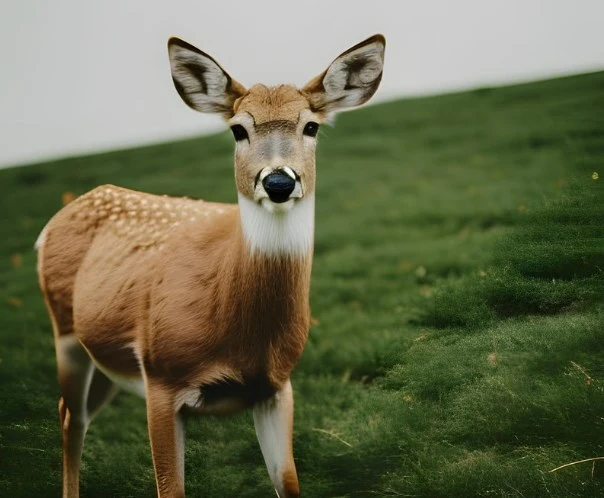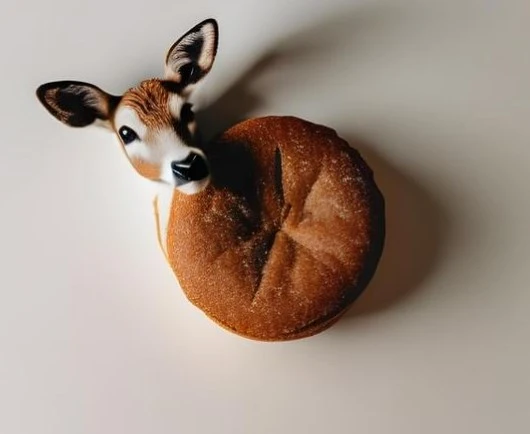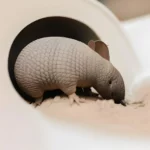Can Deer Eat Bread? Well, wonder no more! Some might think feeding deer bread is an excellent way to help them, but is it safe for these gentle creatures?
First of all, it’s essential to know what deer usually eat. They are herbivores, which means they only eat plants like grasses and leaves. Bread is not part of their natural diet, so giving it to them could be harmful. Let’s explore why this might be the case in the following paragraphs.
Can Deer Eat Bread? Understanding Deer’s Natural Diet
Can Deer Eat Bread? Deer are herbivores, which means they only eat plants. They have unique grazing and foraging habits that help them survive in the wild. Deer grazing involves consuming leaves, flowers, fruits, twigs, and even bark from different types of trees. Their foraging habits change with seasonal changes as well.
Deer’s dietary adaptations allow them to select specific plant species according to their preferences and nutritional requirements. This eating pattern helps them balance their nutrient needs while avoiding harmful substances like toxic plants or fungi. For example, when food is scarce in winter, deer may consume more woody vegetation than grasses.
Overall, understanding deer’s natural diet is essential for survival in the wild. While it might be tempting to feed them bread or other human foods, it’s crucial to avoid doing so because it can harm their health and alter their feeding patterns. In the next section, we will discuss why feeding deer bread can be dangerous for humans and wildlife.
The Dangers Of Feeding Deer Bread
Can Deer Eat Bread? Deer are herbivores, which means they primarily eat plants. Their feeding habits involve consuming a variety of grasses, leaves, and fruits that grow in their natural habitat. Deers also need to drink water regularly to stay hydrated.
Feeding deer bread is not recommended as it can pose health concerns. Bread lacks the essential nutrients and minerals that deer need to maintain good health. Additionally, bread contains high levels of carbohydrates and salt that can negatively affect a deer’s digestive system and lead to health problems such as diarrhea or dehydration.
It is important to remember that feeding wildlife, including deer, is generally discouraged by experts as it disrupts their natural diet and behavior. If you want to help support local wildlife populations, consider creating a bird feeder or planting native vegetation instead of offering human food like bread.
Bread’s Lack Of Nutritional Value For Deer
Did you know that bread is not a nutritious food for deer? While it may be a staple in many human diets, deer have different dietary needs and preferences. Feeding wild animals such as deer can cause harm to their health and well-being.
Here are some reasons why bread should not be given to deer:
- Bread contains high amounts of carbohydrates and little nutritional value, which can lead to obesity and other health issues.
- Deer have natural foraging habits where they consume plants, shrubs, grasses, fruits, nuts, and seeds as part of their balanced diet.
- Feeding bread or any human food to wildlife can alter their behavior, leading them to depend on humans for sustenance.
They understand the potential consequences before offering non-nutritious foods like bread to wild animals. By respecting their natural habitat and eating patterns, we can help preserve the balance of ecosystems around us.
Let’s explore how feeding deer with inappropriate food sources could lead to digestive problems.

The Potential For Digestive Issues
Can Deer Eat Bread? As mentioned in the previous section, bread doesn’t offer much nutritional value for deer. However, there’s a more significant issue when feeding them this bakery staple: their digestive system. Unlike humans, deer have sensitive stomachs and cannot digest certain foods easily.
Feeding deer bread can lead to potential digestive issues such as bloating, diarrhea, or constipation. Bread is high in carbohydrates and lacks fiber, making it difficult for deer to process correctly. This may cause discomfort and even health problems that could be avoided by sticking to their natural diet of grasses, leaves, fruits, and nuts.
It’s important to note that some types of bread can also be toxic for deer due to their sugar and salt content. When consumed in large amounts over an extended period, these ingredients can disrupt the balance of electrolytes within the body, leading to dehydration, seizures, or worse. Therefore, it’s best not to feed wild animals anything other than what they typically eat.
| Type of Bread | Sugar Content | Salt Content |
|---|---|---|
| White Bread | 2g per slice | 150mg per slice |
| Wheat Bread | 2g per slice | 200mg per slice |
| Rye Bread | 1g per slice | 250mg per slice |
As shown in the table above, all three types of bread contain varying levels of sugar and salt, which aren’t beneficial for deer if consumed regularly. It’s crucial to remember that just because something is edible for us humans doesn’t mean it should automatically be given to wildlife too.
Can Deer Eat Bread? In conclusion, while bread might seem like a harmless snack option for deer or other wild animals we come across during outdoor adventures; it can do more harm than good. Their sensitive digestive systems, and potentially toxic sugar and salt content, make bread a wrong food choice for them. Instead, leave them to their natural diet and avoid feeding them anything detrimental to their health.
Bread’s High Salt And Sugar Content
Did you know that bread isn’t just a favorite human food but is also often fed to wildlife? However, while we may enjoy the taste of bread, it can negatively impact animals like deer. One issue is its high salt and sugar content.
Salt and sugar are not nutrients that deer need in their diet. Too much can be harmful to these creatures. Consuming bread with high levels of salt or sugar can cause dehydration or even disrupt their metabolism. Additionally, feeding them bread regularly can lead to malnourishment since they’re not getting the proper nutrition they require from their natural food sources.
While feeding bread to deer may seem harmless at first glance, this common practice can hurt these animals more than help them. It’s important to remember that what we consider a treat for ourselves might not always suit other living things around us. Also, attracting wildlife with food like bread could bring other unwanted visitors onto your property.
Transition: Now that we understand how bread’s impact on wildlife goes beyond deer alone, let’s look at how it could attract other unwanted critters to our yards.
Attracting Other Unwanted Wildlife
Oh no! You’ve noticed that not only are deer coming to your yard for food, but other unwanted wildlife as well. This can be frustrating and sometimes alarming, especially if you’re trying to prevent overpopulation or manage your food waste. But don’t worry; you can take steps to deter these animals from your property.
Firstly, it’s essential to understand why these critters are showing up in the first place. Are there easily accessible sources of food? Is there shelter available? Identifying what attracts them will help you determine how best to eliminate them. Some possible solutions include:
- Removing any outdoor pet food
- Storing trash cans securely
- Installing motion sensor lights or sprinklers
- Placing mesh covers on gardens or fruit trees
- Closing off any access points to buildings
Preventing overpopulation is crucial for the animals’ health and maintaining balance in ecosystems. By managing food waste properly and taking proactive measures, we can lessen the likelihood of wild animals becoming dependent on human-provided resources. Remember, we share this planet with many different species – let’s do our part to coexist peacefully.
Now that you have some ideas on keeping unwelcome visitors at bay, let’s explore alternative food options for deer that won’t harm them or disrupt their natural behavior patterns.

Alternative Food Options For Deer
Now that we’ve discussed how to avoid attracting unwanted wildlife let’s talk about alternative food options for deer. While bread may be tempting for them, it’s important to remember that it isn’t the healthiest choice. Instead, consider offering fruits and vegetables.
Fruit options can include apples, pears, and berries. These natural snacks for deer provide the necessary nutrients for their diet. Additionally, vegetable options such as carrots or sweet potatoes can be offered. It’s important to note that these should be cut into small pieces to prevent choking hazards.
When providing alternative food options for deer, it’s crucial not to overfeed them or interfere with their natural habits. Respect their dietary needs and feeding patterns by only offering small amounts occasionally. By doing so, you will not only help nourish local wildlife but also ensure they stay healthy in their natural habitat.
Respecting Wildlife And Their Natural Habits
Hey there, nature lovers! Have you ever wondered if it’s okay to feed bread to the deer? Discuss some eco-friendly practices and ethical considerations when respecting wildlife and their natural habits.
Firstly, feeding wild animals can make them dependent on humans for food. This can cause them to lose their ability to hunt or forage for themselves in the wild. Additionally, many human foods are not nutritionally beneficial for animals and can cause health problems like obesity or malnutrition. So instead of feeding deer bread or other human foods, try leaving out natural options like nuts, fruits, or vegetables they would typically eat in the wild.
Secondly, it is essential to remember that these creatures deserve our respect and should be cared for. Interfering with an animal’s natural behavior can disrupt its ecosystem, negatively affecting plants and other nearby animals. Therefore, we must always consider ethical considerations before taking action around wildlife.
In conclusion (oops!), being mindful of eco-friendly practices and ethical considerations is crucial when interacting with wildlife. Let’s do our part by avoiding harmful actions such as feeding inappropriate food items and interfering with their natural behaviors. By doing this, we can ensure a harmonious coexistence between humans and animals while preserving our beautiful planet Earth for generations to come!
Frequently Asked Questions
Can Deer Eat Bread? How Much Bread Should I Feed Deer?
If you want to feed deer bread, knowing how much to give them is essential. The feeding frequency should be considered, as too much bread can upset their stomachs. It’s also important to remember that while bread may taste good to us, it doesn’t have a lot of nutritional value for the deer. Instead, consider offering fruits and vegetables as snacks for these animals.
Can Bread Be Harmful To Deer In Small Amounts?
Bread can sometimes harm deer in small amounts because it lacks the nutrients for a balanced diet. While bread may seem easy to attract deer, it’s important to remember that their health should come first. Feeding them too much bread could lead to digestive problems and malnutrition. Generally, it’s best to avoid feeding deer bread altogether and stick with natural food sources like fruits and vegetables.
Will Feeding Deer Bread Make Them Dependent On Humans For Food?
Feeding deer bread may make them dependent on humans for food. This is because they will start associating humans with a food source and may become too reliant on it. Some people have ethical concerns about feeding wild animals, as it can disrupt their natural behavior and cause problems in the ecosystem. It’s important to remember that wild animals should be allowed to find their food sources and not rely on human intervention. So while deer can technically eat bread, it’s best to avoid feeding them altogether to prevent dependency issues and uphold ethical considerations.
Can Deer Digest Bread Better Than Other Animals?
Deers have unique dietary needs, and providing them with the correct food alternatives is essential. While bread may not be the best option for deer, they can still digest it like other animals. However, better choices, like fruits, vegetables, and grains, can meet their nutritional requirements. It is crucial to remember that feeding wild animals should only be done in small amounts and occasionally not to make them dependent on humans for survival.
What Are The Long-Term Effects Of Feeding Deer Bread?
Feeding deer bread as a regular part of their diet can cause nutritional deficiencies. Finding possible alternatives such as fruits, vegetables, or hay is essential for the deer’s long-term health. Bread does not provide all the nutrients deer need to stay healthy and strong. If you want to help feed the deer in your area, it’s best to research what they eat naturally before giving them anything else.
Conclusion
So, can deer eat bread? Well, the answer is yes! However, it’s essential to remember that too much bread can harm these beautiful creatures. If you decide to feed them bread, only give them a small amount and not rely on it as their primary food source.
It’s also important to remember that feeding wildlife can have negative consequences in the long run. While it may seem like a kind gesture, animals can become dependent on humans for food, leading to health problems and altering their natural behaviors. So next time you see a deer in your backyard, admire them from afar and let them find their food in nature.

